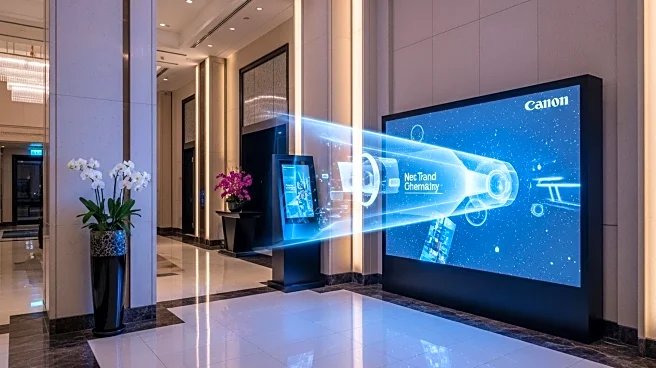What is the story about?
What's Happening?
AI Max, a new advertising technology, is transforming hotel marketing by integrating AI-driven paid answers into search campaigns. Launched globally last May, AI Max powers Google Ads, Ads Editor, Search Ads 360, and the Ads API, interpreting user intent and generating dynamic ad copy. This technology dispatches users to highly contextual landing pages, enhancing the visibility of hotels in search results. The traditional hyperlink economy, where users clicked through ads to reach external sites, is being replaced by AI-generated narratives that embed advertisements within the content itself. This shift marks a significant change in how hotels compete for visibility, as ads are now seamlessly integrated into AI-generated responses, making them indistinguishable from editorial content.
Why It's Important?
The introduction of AI Max signifies a major shift in the advertising landscape, particularly for the hotel industry. By embedding ads within AI-generated content, hotels can achieve greater visibility and engagement with potential customers. This approach challenges the traditional click-based web economy, where visibility was dependent on external links. The seamless integration of ads into AI narratives allows hotels to reach consumers at the moment of desire, potentially increasing conversion rates. However, this also raises concerns about transparency and control, as hotel narratives are reconstructed by Google's AI, limiting the hotel's ability to manage its brand story. The shift to AI-driven advertising could redefine marketing strategies across industries, emphasizing the importance of AI as a central interface.
What's Next?
As AI Max continues to evolve, hotels and other businesses will need to adapt their marketing strategies to leverage AI-driven visibility effectively. This may involve rethinking traditional advertising models and focusing on creating content that aligns with AI-generated narratives. Businesses will need to balance the benefits of increased visibility with the challenges of maintaining brand integrity in an AI-mediated environment. Additionally, the shift towards AI-driven advertising may prompt regulatory scrutiny regarding transparency and consumer protection, as the line between organic content and paid promotion becomes increasingly blurred.
Beyond the Headlines
The integration of AI-driven advertising into search results raises ethical and cultural questions about the nature of consumer choice and the role of technology in shaping perceptions. As AI-generated content becomes more prevalent, there is a risk of diminishing the diversity of voices and perspectives available to consumers. This could lead to a homogenization of content, where only those who can afford to be inscribed within AI narratives maintain visibility. The long-term implications of this shift may include changes in consumer behavior, as individuals become accustomed to receiving information and recommendations directly from AI systems, potentially reducing the influence of traditional media and advertising channels.

















